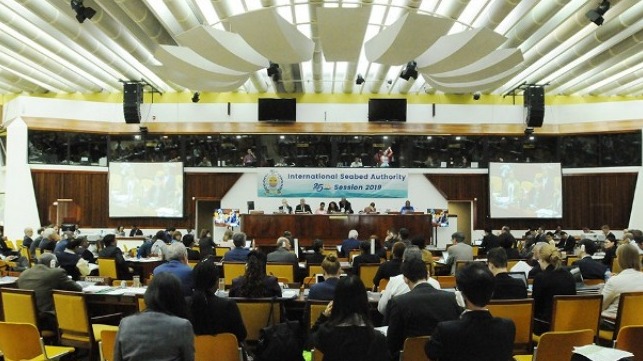Why the Rush for Seabed Mining?

A new report asserts “corporate capture” of the International Seabed Authority (ISA) and the manipulation of Pacific regional decision-making processes by deep sea mining companies and their backers. It calls for a moratorium on the development of deep sea mining regulations and the issuing of exploration and exploitation licenses in international and national waters.
The report Why the Rush? published by Mining Watch Canada, Deep Sea Mining Campaign and London Mining Network claims regulatory processes have been fast tracked before Pacific Island citizens, whose lives and livelihoods are intrinsically tied to the ocean, have had a chance to meaningfully discuss the industry.
The report describes how the PNG Government is facing a debt equivalent to one-third of the country’s annual health budget for nine million people, with citizens angry that funds used to buy a stake in the Solwara 1 mine could have been spent on much needed infrastructure and services.
The groups that published the report question: why the rush to mine the sea floor, when transitioning to a circular economy and urban mining represents the most financially and environmentally viable way forward? Research indicates it will be more lucrative, will deal with an intractable waste problem as well as being capable of meeting future global mineral demand.
Dr. Catherine Coumans of Mining Watch Canada, stated, “The declining health of the world’s oceans is well documented, with warnings of alarming implications for human health, prosperity and long-term survival. Given the urgency of the species extinction crisis we now face the last thing humanity needs is to hand the deep seabed over to a destructive industry that has proven itself to be so irresponsible on land.
“Rather, we need a moratorium on deep sea mining and on the development of seabed mining regulations. Society at large has not agreed to the emergence of this high-risk speculative industry that is driven by a narrow profit-focused agenda of a handful of people.”
The ISA is yet to publish a response to the report. However, it has responded to a report published earlier this month by Greenpeace. The report In Deep Water stated that the world’s oceans could face severe and irreversible harm unless tighter environmental safeguards are in place that protect them from deep sea mining. In response, the ISA stated the report “regrettably contains a series of inaccurate elements and factual mistakes, particularly in relation to the existing legal regime set up by international law.”
ISA clarified saying, in part:
The legal regime for the seabed beyond national jurisdiction (which covers 54 percent of the global ocean) is an integral and fundamental part of the international system for ocean governance under the 1982 United Nations Convention on the Law of the Sea (UNCLOS), which is often referred to as the constitution for the ocean. The ISA is established by the Convention to manage the mineral resources of the deep seabed, which are designated ‘the common heritage of mankind’ on behalf of all humanity.
As a regulatory body, ISA’s role is to allow the sustainable development of mineral resources in a way that balances the need for minerals with rigorous environmental protection. Under international law, no State may explore for or exploit mineral resources in the deep seabed except under a contract with ISA and under the stringent conditions specified in UNCLOS and ISA regulations.
ISA is an intergovernmental organization and its decisions are made by consensus among its 168 Members, all having one vote, with all States and interests represented. ISA also welcomes 90 Observers including 28 non-governmental organizations (including Greenpeace) that all have the right to share their views and concerns.
UNCLOS also gives ISA complete and unequivocal jurisdiction to manage environmental impacts of deepsea mining wherever they may occur; be it in on the seafloor or water column. All applications for exploration rights must be accompanied by an assessment of the potential environmental impacts of the proposed activities and by a description of a program of oceanographic and baseline environmental studies in accordance with international law. The regulations of ISA contain the most highly developed rules for environmental impact assessment for any activity in the ocean beyond national jurisdiction. Even more stringent rules are currently under development for the exploitation phase.
The legal regime to regulate prospecting, exploration and future exploitation of deep-sea minerals is being developed in a transparent public forum of consensus-building by the international community and in compliance with international law. It is anchored in the driving principle that the proceeds of deep-seabed mining will be shared on a basis of equity, in a transparent manner, and for the benefit of mankind as a whole. There is no other comparable regime that places protection of the environment and benefit to humanity at the front and center of its mandate.
The report Why the Rush? is available here.
